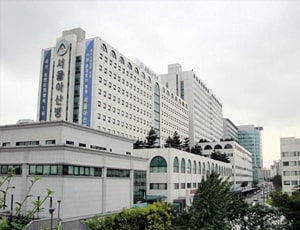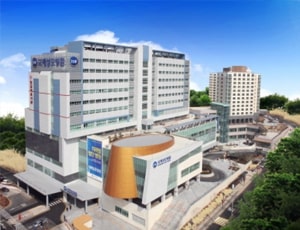Treatment cost

Asan Medical Centre located in Seoul, South Korea is accredited by ISO. Also listed below are some of the most prominent infrastructural details:


International St. Mary's Hospital located in Seoul, South Korea is accredited by JCI. Also listed below are some of the most prominent infrastructural details:
Kidney cancer, also called “renal cancer”, is a condition where the cells in the kidneys grow out of control. So, forms a small mass also called a renal cortical tumor. This tumor could be malignant or benign. A malignant tumor is cancerous and may spread to other parts of the body. A benign tumor is also cancerous but it does not spread to other parts of the body. A benign tumor can grow but won’t spread.
The exact reasons behind most kidney cancers are not completely understood. Doctors believe kidney cancer starts when certain cells in the kidney change their DNA, like a set of instructions inside the cell(mutation). These changes signal the cells to grow and multiply quickly. As these abnormal cells gather, they create a lump called a tumor, which might go beyond the kidney. In some cases, these cells can break away and travel to other parts of the body, a process known as metastasis.
Once you are diagnosed with kidney cancer and know the stage of cancer, your doctor and you can plan your treatment. Your doctor may refer you to a specialist such as a urologist, a radiation oncologist, or a surgeon for treatment. There are many types of kidney cancer treatment. However, in most cases, surgery is the first step. Sometimes, even if the surgery removes the entire tumor, your doctor may recommend additional treatments, to kill the remaining cancer cells, if any. Here below are a few types of treatment for kidney cancer.
To tackle kidney cancer, the first step often involves surgery to remove the cancer cells. If the cancer is only in the kidney, surgery might be the most preferred treatment needed. But if the cancer has spread, there could be other treatments recommended.
The patient and treatment team can discuss what's the best procedure depending on the situation. The right plan depends on things like your overall health, the type of kidney cancer you're dealing with, how far it has spread, and what you prefer for treatment.
When kidney cancer comes back or spreads, curing it becomes challenging. However, treatments aim to control cancer and enhance comfort:
After your procedure, the doctor and team check with you regularly to monitor your incision and evaluate your comfort level.
Generally, the patient may resume consuming solid food within 24 to 48 hours of surgery. Most patients can be discharged from the hospital after 1 to 2 nights in the hospital and may continue recovery at their own home. Patients with larger tumors might expect to stay in the hospital for 2-4 days. will likely have a follow-up appointment in 2 to 4 weeks. At this time, the surgeon will suggest when could return to work.
Because physical activity helps boost blood circulation and also decreases the risk of clots. Patients are encouraged to exercise during their recovery from kidney cancer surgery.
Ask your healthcare adviser for the best multiple options and choose the one that meets your expectations
Kidney Cancer Treatment cost in Seoul varies from one hospital to the other. Some of the best hospitals for Kidney Cancer Treatment offer a comprehensive package that covers the end-to-end expenses related to investigations and treatment of the patient. Typically, the package cost of Kidney Cancer Treatment in Seoul includes the expenses related to the surgeon's fee, anesthesia, hospital, meals, nursing and ICU stay. Extended hospital stay, complications after the surgery or new diagnosis may affect the overall cost of Kidney Cancer Treatment in Seoul.
There are many hospitals across the country that offer Kidney Cancer Treatment to international patients. For quick reference, the following are some of the leading hospitals for Kidney Cancer Treatment in Seoul:
After discharge from the hospital, the patient has to stay for another 23 days in the country for complete recovery. This is important to ensure that the surgery was successful. During this time, control and follow-up tests take place to check for medical fitness.
Apart from the cost of Kidney Cancer Treatment, the patient is also required to pay additionally for daily meals and guest house accommodation. These include the cost of accommodation and meals outside hospital. The per day cost in this case may range from 40 USD.
The patient is supposed to stay at the hospital for about 5 Days after Kidney Cancer Treatment surgery for monitoring and care. The patient is subjected to several biochemistry and radiological scans to see that everything is okay and the recovery is on track. After making sure that patient is clinically stable, discharge is planned.
Out of all the hospitals in Seoul, there are about 2 Hospitals best hospitals for Kidney Cancer Treatment in Seoul. These hospitals have proper infrastructure for the treatment of patients who require Kidney Cancer Treatment. Additionally, these hospitals are known to comply with the international standards as well as local legal requirements for the treatment of patients.
Some of the most sought after doctors for Kidney Cancer Treatment in Seoul are: